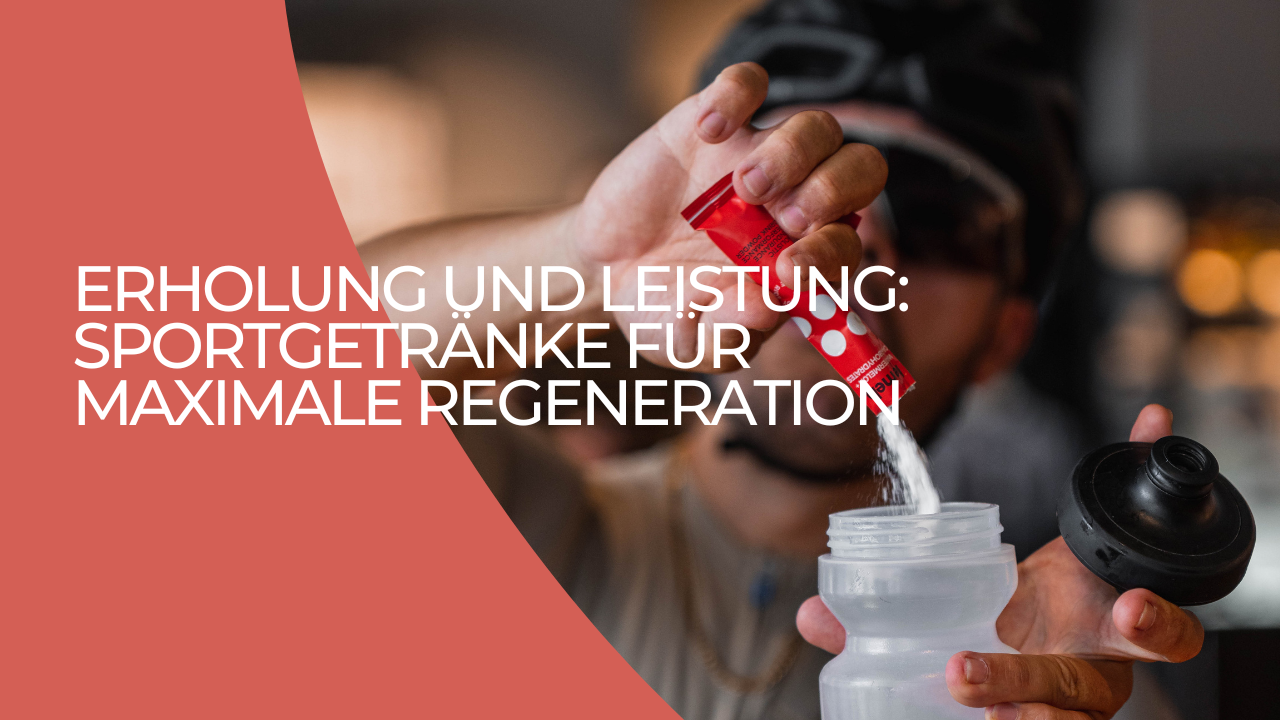Sports drinks play a central role in cycling. They not only provide fluids, but also electrolytes and energy for intensive cycling tours.
Why are sports drinks so important for cyclists?
Sports drinks are much more than just a refreshing drink, they are a specialized solution to provide cyclists with the fluid and energy they need. Although carbohydrates are often highlighted as the main source of energy, their presence in a sports drink is not always essential.
A cyclist's vitality and endurance depend heavily on adequate fluid intake. During intense pedaling, the body continually loses fluids, and this is where sports drinks come into play. They are specifically designed to quickly compensate for the loss of electrolytes that are excreted when sweating. Sodium, potassium and magnesium are some of the key ingredients that help restore electrolyte balance, prevent muscle cramps and optimize nerve function.
Carbohydrates are undoubtedly an important source of energy. They are the firewood that keeps the cyclist's endurance and performance fire burning. Carbohydrates help replenish the body's glycogen stores, which are depleted during intense physical exertion. This is particularly important for long-distance cyclists who require a constant flow of energy to maintain their performance over long periods of time.
However, a sports drink does not necessarily have to contain carbohydrates. Energy can also be obtained from other sources, and in some cases, consuming too many carbohydrates during exercise can cause stomach upset. It is a question of individual needs and tolerability. A well-balanced sports drink tailored to the athlete's specific needs can be effective even without a high carbohydrate content.
The main function of sports drinks is to promote hydration and replace lost electrolytes, which is crucial for maintaining physical and mental performance. A well-hydrated cell is more efficient and can help improve overall endurance, reduce fatigue and shorten recovery time.
The importance of hydration
Water is undeniably an indispensable part of any form of physical activity. When cycling, a sport that often pushes the body to its limits, water plays an even more important role. The penetrating power of the kicks, the speed of the descents and the intensity of the climbs put a strain on the body in every respect and thus also on its water balance.
The need to stay hydrated while cycling is not just a matter of comfort but also performance. Dehydration can lead to reduced endurance, increased fatigue and even serious health problems. This is where sports drinks come into play, which can act as a lifesaver in situations of intense physical exertion.
Sports drinks not only provide fluid, but also important electrolytes that are lost through sweat when cycling. Sodium, potassium, magnesium - each of these micronutrients plays a crucial role in maintaining muscle and nerve function, regulating pH and supporting biochemical processes. A loss of these valuable minerals can lead to cramps, weakness and reduced performance.
The magic of sports drinks lies in their precise composition. Each element, each ingredient is carefully selected and dosed to not only hydrate the body, but also revitalize and strengthen it with the necessary electrolytes. When you sweat, the body not only loses water, but also electrolytes. Balancing these minerals is essential for maintaining cellular functions, electrolyte balance, and overall homeostasis of the body.
Additionally, sports drinks provide an instant and efficient way to revitalize the body during exercise. Given the efforts and challenges that cyclists face on their routes, these drinks are a source of refreshment. They provide the body with a quick burst of energy and help restore vitality, which is critical to achieving and maintaining peak performance.
The use of sports drinks while cycling is therefore an essential component for anyone who wants to maximize their performance, improve their endurance and speed up recovery after an intense ride. It's not just about energy, but also about optimal functioning of the body, which is supported by a balanced supply of water and electrolytes.
The optimal composition of the sports drink
The le melo sports drink is not just a drink, but a sophisticated cocktail of performance-enhancing ingredients. Each sip contains a balanced mix of electrolytes and carbohydrates to efficiently replenish energy stores and regulate fluid balance. For athletes striving for peak performance and endurance, le melo is synonymous with a continuous source of energy and improved hydration. It is the result of careful research and development with a formula tailored to the specific needs of cyclists.
Electrolytes in focus
Electrolytes are at the heart of le melo's effectiveness. They are essential for cyclists to achieve peak performance. Every drop of the drink contains electrolytes to strengthen muscle function, regulate fluid balance and optimize nerve function. The natural loss of electrolytes through sweating is compensated for by le melo's special formula, enabling constant and optimal performance.
Carbohydrates - a dosage guide for cyclists
The role of carbohydrates as an energy source in cycling is undisputed. However, the correct dosage and the appropriate delivery form are crucial to achieve and maintain optimal performance levels. At le melo, we have consciously minimized the carbohydrate content in our sports drinks to give cyclists flexibility in their energy intake and to avoid overloading the system.
As a rule of thumb, cyclists need between 30 and 60 grams of carbohydrates per hour of physical activity. However, this amount can vary depending on the intensity of the activity and the individual metabolic rate. Carbohydrates can be effectively absorbed from various sources, and in some cases gels, bars or even solid foods can be a complementary option.
Gels and other dietary supplements containing carbohydrates offer the advantage of quick and targeted energy supply. They are easy to digest and can be quickly absorbed into the blood, ensuring an immediate supply of energy. This form of carbohydrate intake is particularly beneficial during long and intense cycling tours, when the body needs an immediate source of energy to maintain performance and prevent symptoms of fatigue.
le melo supports this strategy and recommends using our sports drinks in combination with other carbohydrate sources to ensure a balanced and sustainable energy supply. The goal is to create a balance between immediately available energy and sustained performance without putting strain on the stomach or destabilizing blood sugar levels.
The precision of carbohydrate delivery, supported by le melo's targeted fluid and electrolyte delivery, allows cyclists to maximize their performance, extend their endurance and pave the way for efficient post-race recovery. The world of high performance cycling is about optimizing every aspect of nutrition and hydration. le melo is your partner on the way to top performance.
Regeneration with sports drinks
When the wheels stop and the pulse drops, the crucial phase of regeneration begins. le melo is also a reliable partner here. With a formula that supports muscle regeneration, accelerates the recovery period and restores physical balance, le melo ensures that every cyclist is ready for the next challenge. A post-workout solution that is as effective as it is refreshing.
Recommendations for cyclists
For cyclists who want to improve their performance, taking le melo regularly and strategically is a crucial factor. The drink is consumed while driving and provides the body with all the necessary nutrients. The balanced intake of electrolytes and carbohydrates during cycling not only maximizes performance, but also optimizes recovery, restores physical homeostasis and prepares the body for future efforts.
le melo is not just a drink, but an investment in optimal performance and endurance for every committed cyclist.
Conclusion
In the dynamic world of cycling, sports drinks are not an option, but a necessity. With le melo, every ride, every climb and every long route becomes an opportunity for top performance.
FAQs
- How much should I drink? 150-250 ml le melo every 15-20 minutes ensures hydration and energy supply.
- Why not just water? In addition to fluid, sports drinks also provide essential electrolytes, minerals and vitamins.
- Is le melo specifically for cyclists? Yes, it is formulated to meet the specific needs of cyclists.
- Can I mix le melo myself? For optimal results and safety, we recommend the finished product.
- When is the best time for le melo? Before, during and after cycling for optimal performance and rapid regeneration.





